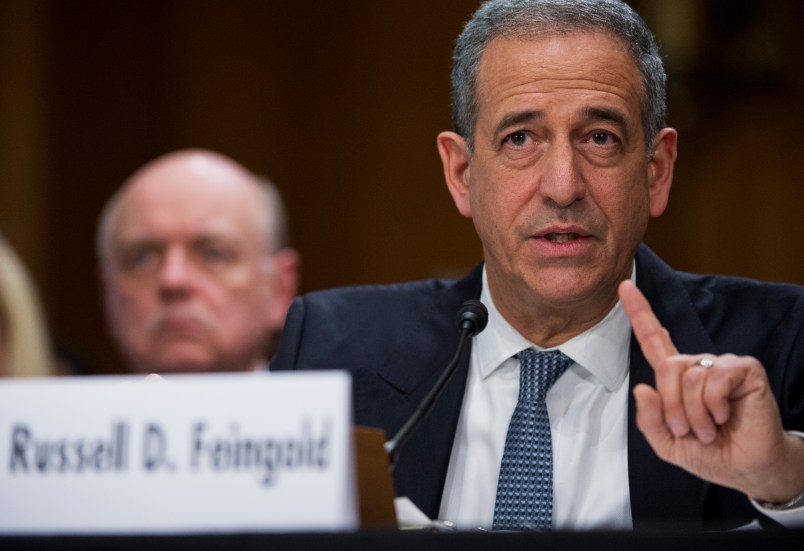Russ Feingold, the former senator who has been one of the most outspoken critics of the modern campaign finance system, is contemplating a run to reclaim his Wisconsin seat in 2016. If he does, he will have to grapple with the increased influence of super PACs and outside spending since his last campaign. He’ll have to either embrace them and risk charges of hypocrisy, or shun them and risk defeat.
Feingold, a vehement critic of the Supreme Court’s Citizens United ruling and the co-author of the eponymous McCain-Feingold campaign finance regulations, may have to swallow a sour pill to help him take back his seat in an era when even his supporters are using super PACs. It would be a shift from 2010, when Feingold lost to Republican Ron Johnson after refusing to condone the creation of a pro-Feingold super PAC, and stopping the Democratic Senatorial Campaign Committee (DSCC) from spending money on TV ads to support him.
Democrats are now signaling that Feingold won’t have much of a choice.
“You can say you don’t like super PACs, you hate super PACs, you can’t stand what they’re doing. All those things may be true. But they exist… and I think you really are running with one hand behind your back if you discourage them,” Karin Johanson, the campaign manager for Sen. Tammy Baldwin’s (D-WI) successful 2012 Senate campaign, said. “And I’m not even sure they’d be willing to be discouraged this year. This is going to be for the control of the Senate.”
Feingold declined an interview request by TPM, but one of his aides said that attacking Feingold on outside spending could blow up in Republicans’ faces.
“Launching a campaign with a conversation about special interest money is a
dangerous ploy for Republicans. And especially this Republican,” the aide said.
Feingold has not officially announced his intention to run, although he’s made some strong moves in that direction. He’s left his position at the State Department and plans to travel around Wisconsin and teach at Stanford
University before announcing his decision. Johnson and Republicans have
already started to attack the former senator as if he were an announced
candidate.
Sen. Jon Tester (D-MT), the chairman of the DSCC, told The Hill that in his discussions with Feingold about possibly running, the super PAC issue came up. Tester suggested that Feingold might at least accept some super PAC support this time around, unlike after the January 2010 Citizens United ruling.
“The conversation [with Feingold] was ‘It’s a new day now.’ In 2010, Citizens United started about two-thirds of the way through on that race, I believe it was in June on a November election. It’s a different world now. And he knows that, he’s smart. He’s a Rhodes Scholar, for chrissakes. And he knows what he’s getting into,” Tester told the congressional newspaper.
Democrats see Johnson as one of the more vulnerable Republican senators up for re-election in 2016. The Democratic-leaning PPP recently released a survey finding Feingold leading Johnson by 10 points. Feingold lost to Johnson in 2010 52 percent to 47 percent. Democrats chalk the loss up partially to the wave of Republican victories in that cycle, and say the playing field will be different given that it’ll be a presidential cycle when turnout tends to be higher.
“Ron Johnson is so vulnerable. Aside from the fact that this is not a good electorate for him, he’s very vulnerable,” Johnson said.
So the question is, even with all the signs pointing to Feingold running again, will he actually do it? University of Wisconsin political science professor Barry Burden told TPM that how he funds campaigns will be a big factor in that decision.
“He is known as a crusader against big money in politics, especially soft money, but he left office before the effects of the Citizens United decision came to fruition,” Burden said. “In past campaigns almost all of his contributions came from individual donors rather than PACs and other groups. It might still be possible to wage a successful campaign using only individual donations, but his opponent is sure to have help from independent expenditures, so the resources would almost certainly be asymmetric between them.”
Indeed, while there’s no pro-Johnson super PAC up in Wisconsin right now, the expectation is that super PACs and outside groups will be active.
“Yeah, I would be surprised if they didn’t try and play in Wisconsin,” National Republican Senatorial Committee Communications Director Andrea Bozek told TPM on Wednesday in an email. “It will be very interesting to see what the godfather of campaign finance reform will say regarding super PACs… hypocrisy alert!”







Reality is reality and this particular reality bites. He must hold his nose and not fight those on his own side. Principles, in the current political environment, don’t stand much of a chance against an avalanche of Koch dollars.
Johnson has got to go.